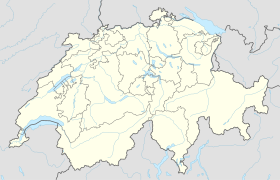Sulz LU
| LU is the abbreviation for the canton of Lucerne in Switzerland and is used to avoid confusion with other entries of the name Sulz . |
| Sulz | ||
|---|---|---|
| State : |
|
|
| Canton : |
|
|
| Constituency : | Hochdorf | |
| Residential municipality : | Hitzkirch | |
| Postal code : | 6284 | |
| former BFS no. : | 1042 | |
| Coordinates : | 663 980 / 230 271 | |
| Height : | 661 m above sea level M. | |
| Area : | 3.84 km² | |
| Residents: | 186 (December 31, 2007) | |
| Population density : | 48 inhabitants per km² | |
| map | ||
|
|
||
Sulz is a village in the Hochdorf district of the canton of Lucerne in Switzerland . Until December 31, 2008 Sulz was a political municipality . On January 1st, 2009 the municipalities of Hitzkirch , Gelfingen , Hämikon , Mosen , Müswangen , Retschwil and Sulz merged to form the new municipality of Hitzkirch.
geography
The village lies on the western slope of the Lindenberg above the Baldeggersee . The municipality boundary follows the Schliessbach up to its origin at the Grossfeld homestead. From there it goes in an easterly direction to the Sulzerwald , the eastern border of which is the municipality and canton border at the same time. In the Sulzerwald lies at 862 m. ü. M. also the highest point in the community. The canton border running south there forms the eastern border of the place. At the source of the Dünkelbach it turns to the west and follows the stream to Chapf. From this point on, the municipal boundary goes north-west back to the Schliessbach.
The place consists of the village of Sulz , Sulzmatt (618 m above sea level; west of the village), the Sulzerberg (812 m above sea level) area and individual farms.
Apart from the large Sulzer Forest, only small areas along the streams are forested: 29.5% of the municipal area. Most of the area - namely 64.9% - is used for agriculture. Only 5.7% are settlement areas.
Neighboring communities
The neighboring municipalities were Gelfingen , Hämikon , Hitzkirch , Hohenrain and Müswangen in the canton of Lucerne and Beinwil (Freiamt) in the canton of Aargau.
population
Population development
| Population development | |
|---|---|
| year | Residents |
| 1850 | 215 |
| 1860 | 214 |
| 1880 | 138 |
| 1888 | 135 |
| 1920 | 195 |
| 1930 | 164 |
| 1960 | 183 |
| 1970 | 149 |
| 2000 | 157 |
| 2004 | 184 |
The village lost numerous inhabitants between 1860 and 1880 due to emigration (1860-1880: −35.5%). The population bottomed out in 1888 with only 135 residents. Thereafter, the population increased again significantly - with strong fluctuations in between - until 1920 (1888–1920: +44.5%). Another decline in population followed in the 1920s, followed by slight growth over several decades. In the 1960s there was another emigration movement (1960–1970: −18.6%). From 1970 to 2000 the number of inhabitants stagnated at a low level. For a few years now, growth has been observed again (2000–2004: +17.2%).
languages
The population uses a highly Alemannic dialect as colloquial language . At the last census in 2000, 99.36% said German and 0.64% French as their main language.
Religions - denominations
In the past, all residents were members of the Roman Catholic Church. This has changed as a result of leaving the church and immigration from other regions in Switzerland and abroad. Today (as of 2000) the religious composition of the population is as follows: There are 84.08% Roman Catholic and 11.46% Evangelical Reformed Christians. In addition, 1.91% non-denominational.
Origin - nationality
Of the 179 inhabitants at the end of 2006, 174 were Swiss and 5 (= 2.8%) were foreigners. At the last census, 98.09% (including dual citizens 99.36%) were Swiss citizens. The two dual citizens come from Italy and Great Britain. The only (!) (Only) foreigner from Germany.
traffic
Until the end of 2011, Sulz was integrated into the public transport network on the Hitzkirch – Gelfingen – Kleinwangen bus route. Both Hitzkirch and Gelfingen have stops on the Lucerne – Lenzburg railway line ( Seetalbahn ).
The place is on a road along the western slope of the Lindenberg. This branches off from the main road Lucerne - Lenzburg in Ballwil and joins it again in Hitzkirch. The closest motorway connections are Sempach on the A2 19 km and Gisikon on the A14 20 km away.
history
Sulz was first mentioned in 1266, when the knight Konrad von Heidegg donated goods in Sulz to the Ötenbach sister convent in Zurich . The community was under the rule of the Habsburgs until 1415 . That year, the city of Lucerne conquered the area. Until 1803 she belonged to the Free Offices as part of the Heidegg rule. Since then she has belonged to the Hochdorf office .
Culture, sport, leisure
- Library and toy library in Hochdorf
- Community hall, all-weather sports ground
- Sports offers in Hitzkirch
- Seaside resort in Gelfingen and Baldegg
- Hiking trails
Attractions
Web links
- Waltraud Hörsch: Sulz LU. In: Historical Lexicon of Switzerland .
- Hitzkirch merger project 7


